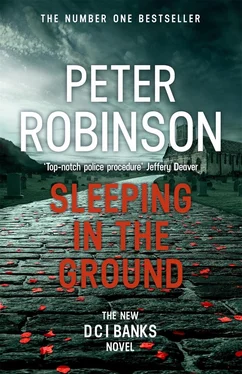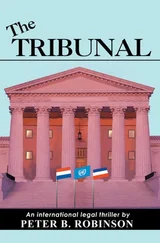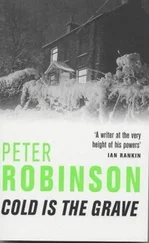‘So were some of the others. Wayne was there, too. Wayne Powell, the best man. And he was uninjured.’
‘Fair enough. But there is a military connection. You mentioned snipers earlier.’
‘Just because of the method.’
‘Yes, but the killer had a military-style weapon — even if it’s one that’s been adapted to make it legal over here — and he knows how to use it.’
‘So you’re suggesting there might be some connection with the war? With Afghanistan? Or that we were somehow symbols of oppression, to be made an example of by IS?’
‘I’m not sure what I’m saying. Only that there are plenty of military people with some sort of expertise in shooting. But could there be a connection? Maybe even someone you knew. I’m just asking you if you can think of anyone from those days. Any incident. Anyone go off the rails, have a grudge against Benjamin Kemp? Anything from your military time, from Benjamin’s military time, that could be in any way connected with yesterday? We know that war can do terrible things to a man’s mind. Maybe someone you served with just lost it for some reason. PTSD, for example. What happened was not necessarily a rational response to anything.’
Terry ran his hand over his head. ‘Yes, but people who suffer from PTSD don’t usually go around committing mass murder. I’m sorry, I can’t think of anything or anyone offhand, but I’ll give it some thought, see if anything comes up.’
‘I understand Benjamin is something of a war hero?’
Terry laughed. ‘Sorry. He always laughed about it. Said it was more of a media invention than anything else. It was, really.’
‘Even so, he did get a fair amount of publicity at the time, didn’t he? I wonder if it was enough to make him a target.’
Terry got up, put his mug down and went upstairs. Banks glanced out of the window and saw that it was getting dark. When Terry came down he was carrying a large scrapbook. He went over to Banks and Annie and opened it to a newspaper clipping. It showed a front-page picture of Benjamin Kemp standing outside a burning ruin holding an Afghani boy of about five in his arms. The boy was staring into the camera and tears were running down his dirt-streaked face. Kemp seemed merely determined, his jaw set firm.
‘That was what it was all about,’ Terry said. ‘Ben rescued a young lad from a bombed-out school, under fire, and there was a war photographer on the spot, ready to capture the event. There were about twelve of us involved in that operation. We’d all been in and done our bit. A few minutes earlier, one of our mates had come out with two boys, one under each arm, but the photographer wasn’t ready. You know what’s so funny about the whole thing? Well, not funny ha-ha, but ironic, I suppose you’d say.’
‘What?’
‘It turned out it was the Americans who bombed the school in the first place. By mistake. They killed fifty-six children and we managed to pull out seven alive. The Taliban fighters were in another building less than a hundred yards away, shooting at us. We cleared them out later. They’d booby-trapped the building they were in, and there’s where I got...’ He tapped his leg.
‘You got a medal, too, didn’t you?’
‘We all did. But there was no photographer present to capture the moment.’
‘Was there anyone involved in that day’s operations you think may have taken against Benjamin Kemp? For any reason. Envy. Feeling slighted. Side-lined. Anything that could become warped and exaggerated into an event like yesterday’s?’
‘Envious enough to shoot up his wedding? No way. We were all just doing our duty. And we were mates. We depended on one another for our lives. I’m not saying events like that happened all the time — it was a pretty intense day, as I remember — but it was wartime, and you did your duty. Everybody thought it was a bit of a laugh that Ben got his picture in the paper, all Rambo.’
‘Maybe somebody didn’t,’ said Banks.
Banks was still not used to his new office. It felt like a suit two sizes too big for him. He had tried to fill the bookcases, but even with a few ornaments, bulky poetry anthologies, forensic texts and orange-covered Penguin paperbacks from the Oxfam shop, there were still too many gaps and not enough family photographs to fill them.
The view was the same as from his old office, only one floor higher up. That Sunday evening, the rain was sweeping down the windowpanes in torrents and bouncing on the cobbles in the market square. The lamps were on in the pubs and shop windows, and Christmas lights and decorations hung all around the square, giving the scene a distinctly Dickensian aspect. Banks could see a few distorted figures shuffling about under umbrellas, and the crowd of reporters, who had set up camp outside the police station. They must be bored, as nothing new had happened during the day.
The office was well enough appointed. Banks’s desk was large and solid, he had a small flat-screen TV attached to the wall, on which he could watch relevant breaking news stories and police press conferences on cases with which he was involved, and there was a low round table for small, informal meetings. He also had a Nespresso-like machine, a promotion present from his Homicide and Major Crimes Squad team, and Annie had made it clear when she presented it to him that she and the others expected to be allowed to nip in for a cup of coffee whenever they needed one. Banks had brought in his own Bose mini sound-dock, with a Bluetooth facility for his Nano. The little iPod didn’t have much memory, but he rotated its contents fairly often from the large music library on his computer at home.
He was reading over the statements taken so far and listening to the Brahms ‘Clarinet Quintet’, whose melancholy edge seemed nicely attuned to the weather outside.
Just as Banks was about to tidy up his desk and go home to enjoy one final night of peace and quiet in Newhope Cottage, the sound of his telephone startled him. It was going on for ten o’clock. He picked up the receiver. It was Chief Superintendent Gervaise.
‘Still at it?’
‘Yes, ma’am,’ said Banks. ‘As a matter of fact, I was just about to head out.’
‘How do you fancy a pint over the road? On me?’
Banks almost dropped the receiver. He had never been for a drink with Catherine Gervaise before; she had always kept a professional distance. He wondered what it was about. ‘Of course, ma’am,’ he said.
‘On one condition.’
‘Yes?’
‘That you don’t call me ma’am.’
The Queen’s Arms was almost deserted at that time on a wet Sunday night. Cyril himself was working behind the bar, and true to her word, AC Gervaise folded up her umbrella, went up and bought two pints of Timothy Taylor’s Landlord Bitter, one for herself and one for Banks.
‘I understand this is one of your favourite tipples,’ she said, setting the glasses on the table. She had changed out of her uniform and wore a simple cream blouse and navy skirt with a matching jacket.
‘To what do I owe this honour?’ Banks asked.
Gervaise said nothing, just shuffled in her seat and made herself comfortable. Banks drank some beer. Cyril had one of his interminable sixties’ playlists going, and Gene Pitney was singing ‘That Girl Belongs to Yesterday’ in the background.
‘It’s something I wanted to tell you in person,’ she said. ‘It’s been a trying two days, and I’m afraid I’m not going to make things any better.’
‘Oh?’
‘I just got a call from James Cook Hospital in Middlesbrough. Katie Shea died on the operating table at five past nine tonight.’
Banks felt the beer turn to lead in his stomach. His teeth clenched and his chest tightened. He felt like standing up and kicking the table over, throwing a chair through the window. Instead, he took several deep breaths, only vaguely aware of Gervaise’s hand on his forearm.
Читать дальше












